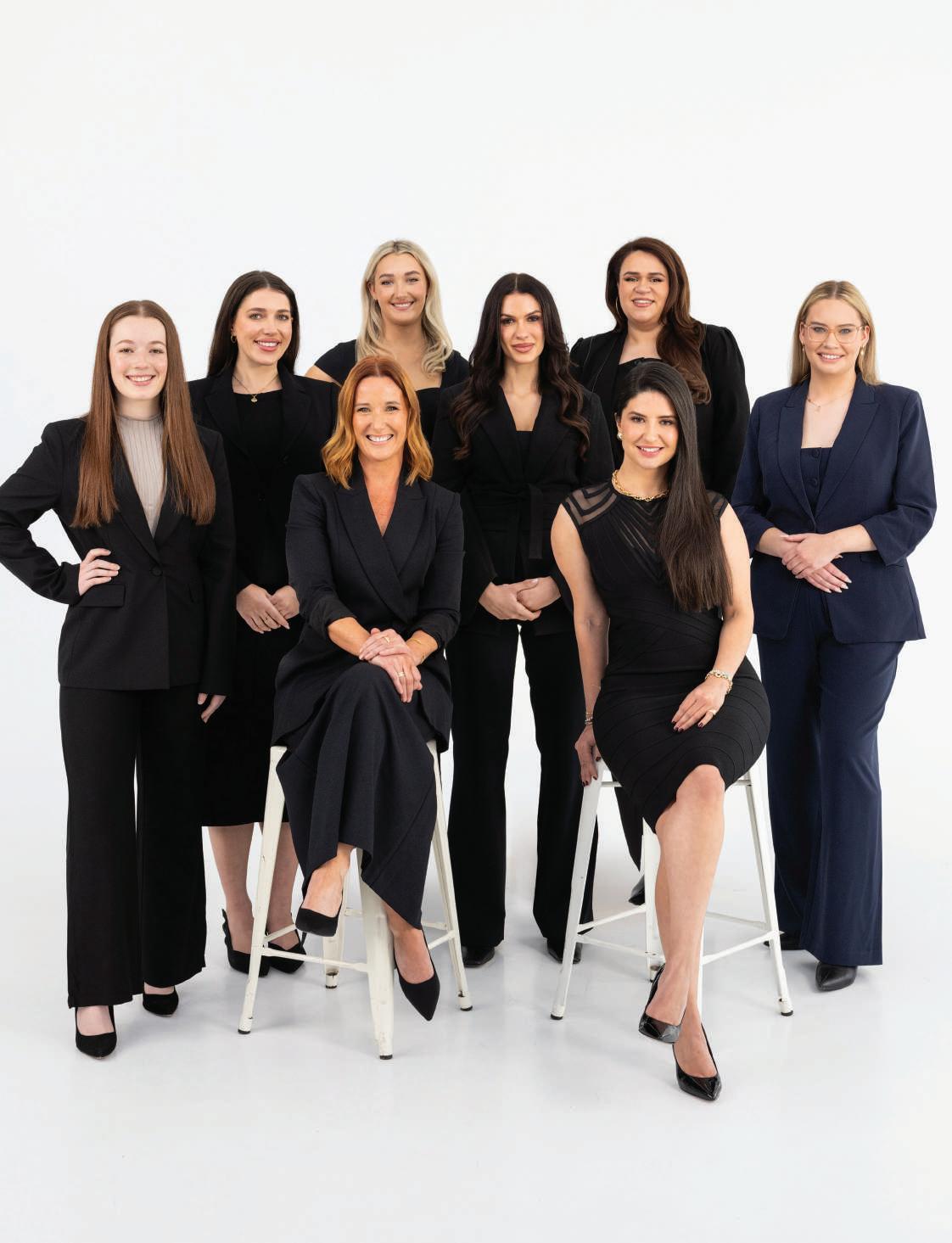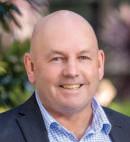




































Help clients access up to $500K fast with ANZ GoBiz digital application. Funds available in just 2 days of signing up.
Music to your ears. Contact us.
CONNECT WITH US
Got a story or suggestion, or just want to find out some more information? twitter.com/MPAMagazineAU
facebook.com/Mortgage ProfessionalAU




























02 Editorial
Are we going to walk the walk on DEI?
04 Statistics
Property’s million-dollar club



06 Opinion
ANZ’s Natalie Smith on why diversity o ers a competitive edge
51 Strategic leadership
The power of empathy as a leadership tool










MPA celebrates the pioneering women who are reshaping leadership in mortgage broking







Built on the decades of experience of its all-female team, SheInvests is paving the path to financial freedom for women













































54 Brokerage insight
For Deb Box, being a woman in broking is no easy task, but it brings rewards
56 Other life




FEATURES THE ROAD TO GENDER EQUITY
The MFAA is pursuing a ‘whole-of-industry approach’ to achieving real change
Compassion and a commitment to giving back are at the heart of Rebecca Morgan’s brokerage








and what industry leaders have to say.

Are we going to keep brute forcing gender parity into every aspect of modern society, or are the days of diversity, equity and inclusion done for?
Donald Trump, as you might recall, returned to the White House as US president earlier this year. His victory brought with it a dizzying array of ramifications for international relations, global trade and social discourse. Almost overnight, some of the world’s biggest multinational companies began throwing their DEI departments under the bus for fear of catching the attention of Trump’s ‘anti-woke’ crosshairs.
IBM scrapped race- and gender-based supplier diversity targets. UnitedHealth Group removed its DEI web page. JPMorgan under chief executive Jamie Dimon scaled back mandatory diversity-related training programs while calling the Democrats “idiots” with “big hearts and little brains” for focusing too much on DEI. PepsiCo tossed its chief DEI o cer position onto the scrap heap. You get the point.
For the sceptics in the audience, this was hardly a surprise. Big business likes to talk
“Big business likes to talk the talk, but when it comes to catching a whiff of political or societal backlash, they’re not always so eager to walk the walk”
the talk, but when it comes to catching a whi of political or societal backlash, they’re not always so eager to walk the walk. Should we really expect anything less from these corporations? Perhaps not, but the DEI decimation that swept across the US this year is nonetheless a reminder that DEI targets are far from a universally lauded concept.
Yet here in Australia, Peter Dutton’s humiliating electoral defeat suggested that our appetite for divisive, Trump-lite anti-woke posturing is not nearly as voracious.
In my experience, that has allowed for an amiable discussion around the inherent gender disparity in the Australian mortgage broking scene. Despite being an industry that is meant to pursue the interests of all Australians, its gender balance has not only stagnated but reversed (women make up under 27% of mortgage brokers).
Some industry leaders – including women – told me we should just accept it and move on; years of trying to balance the equation have borne no fruit. Others believe we must double down and work harder to bring more women into the industry by creating an inclusive, supportive environment.
Everyone has their opinion, but one thing’s clear: women’s contributions to broking deserve equal recognition. In this DEI-focused edition of MPA, enjoy stories and insights from top female talent, and don’t miss our Elite Women 2025 Special Report on page 13.
William Farrington, editor, MPA
AUGUST 2025
EDITORIAL ENQUIRIES tel: +612 8437 4711 william.farrington@keymedia.com
SUBSCRIPTION ENQUIRIES tel: +61 2 8311 5831 • fax: +61 2 8437 4753 subscriptions@keymedia.com.au
ADVERTISING ENQUIRIES claire.tan@keymedia.com
MortgageProfessionalAustralia is part of an international family of B2B publications and websites for the mortgage industry
AUSTRALIAN BROKER simon.kerslake@keymedia.com
T +61 2 8437 4786
NZ ADVISER alex.knowles@keymedia.com
T +64 9 200 1319
CANADIAN MORTGAGE PROFESSIONAL shane.lakhani@keymedia.com
T +1 720-441-2255
MORTGAGE PROFESSIONAL AMERICA charles.weed@keymedia.com
T +1 720-441-2255
MORTGAGE INTRODUCER (UK) matt.bond@keymedia.com
T +44 203 868 3406





$204bn
Value of residential home loans settled by brokers in six months to Sept 2024


22,265
Total number of mortgage brokers as of Sept 2024 – the highest ever recorded
In 2015, just 273 suburbs had median house prices above $1 million. The most expensive were in NSW, Victoria and WA. By 2025, seven of the top 10 were NSW suburbs, and nine had medians exceeding $5 million. A total of 226 suburbs now have a median house price of more than $2 million. MILLION-DOLLAR SUBURBS: THEN VS NOW




24%
Increase in brokers writing commercial loans in year to Sept 2024
$23bn
Value of commercial loans settled by brokers in six months to Sept 2024
Source: MFAAIndustryIntelligenceService,19thEdition
Australia saw nearly 722,000 property settlements in FY25, up 3.2% from FY24, with the total value jumping 9.4% to $726.7 billion. Growth was driven by higher average prices, especially in Queensland and WA.




























































































Median rents remain above pre-COVID levels, with strong growth from 2021 to 2024. However, the pace of growth has eased since late 2024 as vacancy rates have gradually risen across most states and territories.






Nearly 45% of Australian suburbs are at record-high housing values, led by Queensland and WA. While some cities, like Darwin and Perth, have rebounded, others lag. Momentum is building, with more suburbs expected to reach new peaks soon.





















Australia’s major banks hold the largest share of residential property assets, but competition is intensifying as non-banks and customer-owned lenders expand. Industry consolidation and digital settlement solutions are reshaping
with brokers now sourcing over half of new mortgage values.
Creating an inclusive workplace strengthens businesses and develops stronger, trusted connections, says Natalie Smith, ANZ’s general manager Retail Broker
IN RECENT years, the mortgage broking industry has made strides towards greater gender representation. But progress is not always linear. Although the number of mortgage brokers has increased, progress in gender diversity remains limited. Women currently make up 27% of our industry, a figure that has remained unchanged for the past seven years. Clearly, there’s more work to do to attract, retain and support women in the broking industry.
As general manager of ANZ’s Retail Broker channel, I’ve seen how diversity strengthens
deeper understanding of people’s needs and property goals – qualities that can support better customer outcomes.
Small changes, big impact
Creating a more inclusive workplace doesn’t require a complete overhaul. Often, it starts with small, intentional changes.
Inclusive job adverts – using genderneutral language and highlighting flexible work options – can significantly widen the pool of applicants. Structured recruitment processes, including diverse interview panels
Diversity isn’t just a box to tick – it’s a competitive advantage
businesses. Diversity isn’t just a box to tick –it’s a competitive advantage. It can drive better performance, boost profitability and help access a wider pool of talent.
Diversity helps us better reflect society and our customer base, improve decision-making, innovate and enhance risk management.
Moreover, we know that mortgage broking is a relationship-driven business – and diversity plays a vital role in helping us build stronger, trusted connections with a broader range of customers. Borrowers want to deal with brokers who understand their needs and explain their loan options clearly, so it’s important that they have a strong understanding of their customers’ backgrounds and unique circumstances. Di erent life experiences bring fresh perspectives and a
and standardised criteria, help reduce unconscious bias and ensure fairer outcomes.
Supporting career returners is another powerful lever. ANZ’s award-winning Return to Work program helps women re-enter the workforce after parental leave or career breaks. Brokers might consider o ering things like mentoring, phased re-entry and tailored learning pathways to support women returning to work.
Flexible work isn’t just nice to have – it’s a powerful driver of enhanced employee engagement. It helps people to better balance their professional and personal responsibilities, which is especially important in an industry where many operate
GOT AN OPINION THAT COUNTS?
Email william.farrington@keymedia.com
as sole traders or small business owners.
We’ve seen that flexibility works; now it’s about how we’re making it a standard part of how we operate. Whether it’s remote work, flexible hours or shared caregiving policies, these arrangements make the industry more accessible and sustainable. But it’s equally important to ensure that men have access to these arrangements too. When men are supported with parental flexibility, it helps shift traditional perceptions around caregiving and encourages a more inclusive culture where flexibility is seen as a business norm, not a gendered exception.
Making these aspects of inclusion feel like the norm is key to driving meaningful change, as research shows that stereotypes, beliefs or expectations around gender roles still prevent women from entering or progressing in the broking industry.
Women often face stereotypes around leadership, caregiving and ambition. They may hesitate to apply for roles or start businesses without visible role models or supportive networks. That’s why sponsorship, not just mentorship, is critical. Sponsors advocate for women’s advancement, open doors and back them when they’re not in the room.
For brokers, the question becomes, Who are you lifting up? Creating a culture of sponsorship doesn’t require a formal program – just a willingness to notice the potential in people and advocate for growth.
In this issue, ANZ’s Elite Women report highlights the achievements of female brokers who are leading with impact. Their stories reflect resilience, innovation and the power of inclusive leadership. Their visibility matters. It inspires others, challenges outdated assumptions and shows what’s possible when businesses invest in diversity.
Natalie Smith is General Manager, Retail Broker at ANZ Banking Group (ANZ).



Prior to her appointment in February 2022, Smith held numerous leadership roles across the banking sector, including tribe lead (head of transformation) in ANZ’s Commercial division.
















IN AN industry long dominated by male voices and outdated models, SheInvests has an ambitious goal in mind.
Founded by brokerage Flint and driven by a cast of women including Emma Stephens, Ana Souza, Laura Williams, Lauren Franzmann, Mia Castellarin, Sinead Grant, Tahli Elliott and Victoria Stefano, SheInvests wants to rewrite the blueprint for how women approach finance.
More than just an initiative, SheInvests is out to provide a platform for education, empowerment and lasting change.
At the helm is Emma Stephens, a seasoned broker with over two decades in finance. But SheInvests isn’t just her vision – Stephens stresses that it’s a collective response to an industry that hasn’t always made women feel seen or heard.
“SheInvests was born out of both professional insight and deeply personal experience,” Stephens tells MPA. “Now, as the conversation around women and wealth gains momentum, SheInvests o ers a much-needed space where women are seen, supported and empowered.”
Built on the lived experiences of its founders and team and powered by Flint’s national broking platform, SheInvests wants to break down the barriers women face at every stage of their lives.
“Over two decades in finance, I witnessed countless women – single mothers, business owners, professionals – hesitate to step into property ownership or investment simply because they felt the system wasn’t built for them,” Stephens says.
She recalls how her journey through career reinvention and motherhood underscored the
importance of having guidance you can trust. Now is the right time for SheInvests, says Stephens, “because the conversation around women and wealth has finally reached the mainstream.”
Women control more assets and purchasing decisions than ever before, she notes, yet they remain underserved by traditional finance. “SheInvests is here to change that narrative and build a community where women feel supported, seen and capable.”
There are a number of gaps that she hopes

at SheInvests means that “every woman who walks through our doors and walks out with a loan, a plan and a sense of power she didn’t know she had”.
As for the long term? “Nothing less than a revolution. We want to see an industry where women dominate portfolios and never again have to ask, ‘Is this space for me?’”
While SheInvests, at its core, serves to secure mortgage finance for women entering the prop-
“Now, as the conversation around women and wealth gains momentum, SheInvests o ers a much-needed space where women are seen, supported and empowered” Emma Stephens, SheInvests
SheInvests can bridge: confidence, accessibility, representation and community. “We simplify the language, address life transitions, and connect women through a support network that reflects their real experiences.”
Of course, while Stephens is the director, SheInvests is the culmination of the e orts of many remarkable women.
Mia Castellarin, Flint’s senior CX for highnet-worth individuals, is one such woman. “SheInvests isn’t just about finance; it’s about freedom,” Castellarin tells MPA. “We don’t just teach; we transform. Confidence comes when you feel understood, not judged.”
In Castellarin’s words, short-term success
erty market, it’s the support network that sets the platform apart from its contemporaries.
SheInvests has teamed up with dozens of women leaders in the finance space, including Molly Benjamin, founder of Ladies Finance Club. Benjamin says, “Emma has been one of our biggest champions – speaking at events, supporting women and helping grow our community.”
For Gemma Mitchell, financial adviser, money coach and host of the Australian Finance Podcast, SheInvests is her go-to referral for clients who need more than just a loan. “They bring strategy, empathy and results,” says Mitchell.








It’s this access to inspirational women in finance that has made SheInvests stand out in an increasingly saturated mortgage finance market.
As Ana Souza, Flint’s group operations manager, says, “Any brokerage can o er home loans. SheInvests is a safe space where women are seen, heard and supported. We’ve been underestimated too – and we lead with empathy. That’s our di erence.”
She adds, “Financial literacy is a basic right. And we’re here to make sure women have the tools, the knowledge and the support to claim it.”
Client testimonials rattle o glittering stories of how the SheInvests crew has helped them secure a home loan when other brokerages have dropped the ball. They speak of the team’s “never-say-no attitude” and Stephens being “a tireless advocate for women’s financial independence”.
For example, SheInvests can help single mothers map out a clear path to homeownership, utilising low-deposit options and government support to make this goal attainable. For young professionals, the focus could be on leveraging their income early, empowering them to start building wealth from the outset of their careers.
When it comes to women navigating significant life changes – such as divorce or a career

National masterclasses: In-person events designed to educate, inspire and connect women across all life stages with expert-led property and nance strategies
Digital education hubs: Always-on access to learning tools, resources and property guides tailored speci cally for women
Interactive webinars: Live sessions covering everything from rst home buying to building investment portfolios, hosted by the SheInvests team and special guests
Bespoke tools and templates: Goal-setting frameworks, property planning worksheets and investment calculators built with women in mind
National events and community: Expanding across major cities to create a movement of women supporting women in their property and wealth-building journeys
“Financial literacy is a basic right, and we’re here to make sure women have the tools, the knowledge and the support to claim it” Ana Souza, SheInvests
shift – Stephens emphasises the importance of providing both structure and clarity, alongside compassionate guidance. “We meet women exactly where they are,” says Stephens.
“These women are often told what they can’t do, but rarely shown what’s possible,” adds Victoria Stefano, Flint’s head of marketing (SA). We customise solutions that respect real life, factoring in income, kids, time and opportunity. No cookie-cutter advice – just strategy that honours the whole woman.”
The many women who have come together to make SheInvests a reality have a wealth of shared experiences to draw inspiration from.
Lauren Franzman, senior CX for first home buyers at Flint, recalls having to work twice as hard as her male counterparts to be taken seriously. “But I used that as motivation,” says Franzman. “I’ve built deep connections with clients, especially young women who feel the same way.”
Franzman adds, “We don’t assume or preach – we listen and tailor our support.
“It’s all about empathy and realness. Confidence comes from clarity, and that’s what we o er.”
Laura Williams, head of settlements at Flint, explains how “every part of SheInvests is informed by our journeys. We’ve all faced situations where the system didn’t quite fit us.”
Being part of a female-led initiative is “energising and meaningful”, adds Williams. “We’re not just working in finance; we’re redefining what leadership looks like.
“Being female-led allows us to challenge outdated models and bring in inclusive, human-centred perspectives. We’ve experienced being underestimated – now we lead with clarity and conviction.”
Meanwhile, Tahli Elliot, Flint’s head of operations (SA), says, “It’s both challenging and rewarding to operate in a space historically dominated by men.”
There is “motivation in defying stereotypes and creating a space where women feel represented and valued”, she adds.
SheInvests is gearing up for a major expansion, with a wave of new initiatives set to roll out nationwide.
“This is just the beginning,” says Stephens, teasing a whole load of national events, education hubs for connecting role models with aspiring investors, plus a new online platform with practical guides and interactive tools so women can access support any time, anywhere.
Then there are the masterclasses, webinars and podcasts that are in the works.
“Emma’s got a big vision, and it’s moving fast,” says Stefano. “SheInvests is building more educational tools, hosting events and finding new ways to reach women who may not even realise what’s possible for them yet. It’s growing with purpose.”
SheInvests is also calling on more passionate female brokers to join and help build the community.









































































WHAT IT means to be a female leader in mortgage is changing, and that change is long overdue.
For years, success has been measured by a narrow standard of long hours, linear progression and singular ambition, says Justine McDonald, a franchise owner and finance specialist at Nectar Mortgages.
“We need to rethink what leadership looks like. Let’s open the door to nontraditional paths, shared roles, flexible leadership models, and mentoring that meets women where they are at,” she explains. “We also need more women speaking at industry events, leading strategy and designing the systems, not just adapting to them.”
This call for change comes as eight years of Senior Executive Census data shows incremental progress has stalled and, in some cases, gender equality is sliding backwards for the first time since the pandemic.
According to the Chief Executive Women’s Senior Executive Census 2024: Keeping Score of a Losing Game report:
• 25 women were CEOs in the ASX300 in 2024, versus 26 in 2023
• 9 out of 10 CEOs are still men
• 1 in 8 CEO appointments were women, compared with 1 in 4 in 2023
• 7 in 10 executive leadership roles remain held by men
IS THERE A LACK OF WOMEN LEADERS FOR YOUNGER WOMEN TO LOOK UP TO AND ASPIRE TO FOLLOW IN THIS INDUSTRY?




“Lead with compassion, live courageously and believe in your unique perspective. You’ve earned your seat. Embrace your successes and make space for other women”
Fatima Dib, Finsure
• 27% of ASX300 companies have gender-balanced leadership teams
• 8 in 10 CEO pipeline roles are held by men
These numbers matter, states WORK180’s What Women Want 2025 report, and women are speaking up about why. Ninety-five percent report facing at least one barrier at work, while just over half (53%) believe conditions are improving, and their top









ANZ is proud to once again sponsor MPA’s Elite Women report, now in its fourth year. This report shines a spotlight on the remarkable women shaping the broking industry.
The women honoured in this report are recognised for their dedication and expertise in helping Australians reach their homeownership or business goals, whether as brokers, aggregators or lender representatives.
These women represent the strength and diversity of our industry, and we’re delighted to celebrate their success in partnership with MPA. Acknowledging their achievements reinforces the value of inclusive leadership and the positive impact it brings to customers and communities
priority remains flexibility. In fact, 70% value it more than a top-tier salary. Pay transparency and sexual harassment policies follow closely behind as essential ingredients for thriving at work.
Within mortgage broking, concerns about representation are growing louder. In MPA’s latest three-year survey data, 91% of women in 2025 said there’s a lack of female leaders






across the country.


Kerry Sainsbury, Credit Success
to look up to in the industry, up from 78% in 2024 and 61% in 2023.
This marked rise suggests the industry is moving in the wrong direction when it comes to visible leadership. For women entering or building careers in broking, the












We remain committed to working better together with brokers, aggregators and industry partners to promote a culture that is inclusive, empowering and enriched by diversity. Through strong collaboration and shared purpose, we are helping to shape a future that reflects the communities we serve – a future driven by innovation, representation and opportunity.
It’s a privilege to continue supporting these outstanding women and recognising the vital role they play in leading our industry forward.
absence of relatable role models can reinforce self-doubt and make long-term progression feel out of reach.
Anja Pannek, CEO of the MFAA, says the industry still has work to do.
The MFAA carried out its Diversity, Equity and Inclusion Survey in February 2024 to get members’ feedback about their experiences and perceptions in the lead-up to the MFAA’s
“I’ve continued to lead with purpose and heart, advocating for clients who believe they’ve struck a credit wall and encouraging brokers around the country to provide solutions that have a genuine impact”
inaugural DEI Summit in May 2025. The survey found that over 50% of respondents believe gender barriers still exist. They identified the main barriers as being:
• unconscious beliefs about gender roles in the workplace
• an industry culture that is not inclusive
• lack of industry experience
• safety concerns
• lack of development opportunities
“Unconscious bias can affect workplace interactions, career promotion and recruitment, while a non-inclusive culture can a ect the retention of women brokers and discourage women from joining the industry,” Pannek explains.
“Acknowledging and addressing these entrenched barriers is important to ensure we can make real progress, and this starts at the top, with our industry leaders.”
She adds that retention, not recruitment, is where the real challenge lies.
“The retention of women in broking is a greater challenge than recruitment,” Pannek says. “There’s a number of steps that can be taken to bolster retention and to enhance career development for women.”
She also points out that Australia is still trailing other major markets in female representation.
The proportion of female brokers in Australia’s mortgage broking industry is slightly lower, at 26.8%, than it is in the UK (30%) and the US (32.5%).

In March of this year, MPA invited industry professionals from across the country to nominate exceptional female leaders for its Elite Women 2025 list.
Nominees had to be working in a role that related to, interacted with or in some way impacted the industry. They should have demonstrated a clear passion for their work and been never previously recognised as MPA Elite Women.
Nominators were asked to describe the nominee’s standout professional achievements over the past 12 months, their initiatives and innovations and their contributions to the mortgage industry.
After a thorough review of all the nominations, the MPA team narrowed down the list to the final 50 Elite Women who have made their mark on the industry.
MPA’s Elite Women report is proudly sponsored by ANZ.
The mortgage industry wasn’t built with women in mind, and many are still finding their place in it, McDonald says.
“Too often, women carry the mental load of both family and career. Without strong support structures, something eventually gives,” she says.
“That’s why community, coaching and permission to do business their own way matter so much.”
Pannek says the industry must do more to spotlight the unique upsides of broking for women.
“While women often have to juggle
work, family and child-caring responsibilities, there are some fantastic advantages of a career in broking, such as the freedom of running your own business and the absence of a gender pay gap,” she says. “The industry needs to promote these benefits.”
Inclusion alone isn’t enough for women. McDonald says, “They want to be supported in a way that recognises their whole life, not just their business output. Policies that enable true flexibility, mental health support, leadership coaching and pathways for career re-entry after a break are essential.”
Culture counts just as much as policy, and
women thrive where they feel safe to lead as themselves.
The proportion of female brokers in Australia remained stable at 26.8% as of September 2024, but in real terms, more women are entering the field, although at a slower rate than men.
MFAA data shows a 5.6% year-on-year increase in women joining the profession. This growth occurred as the total number of brokers reached a record high of 22,265, indicating that the rise in female participation is part of a broader expansion




across the industry, with residential and commercial lending volumes at new peaks and mortgage brokers holding a 74.6% market share.
MPA’ s 2025 Elite Women remind the industry of what it takes to move things forward. This year’s Top 50 female leaders were selected through a rigorous nomination and review process. Each has achieved standout results and driven change through innovation, mentorship and leadership that’s helping shape a new era in mortgage broking.
“There are many incredibly talented women in the mortgage and finance broking industry achieving great things for themselves, their businesses and their clients,” says Pannek.
“An Elite Woman is someone who exemplifies excellence in everything she does. She is dedicated, passionate and highly professional in serving customers, working with colleagues and industry partners.”
McDonald believes that female leadership shouldn’t be measured solely by revenue targets. Modern leadership must be about building a business that reflects personal purpose and brings others along.
“An Elite Woman measures success by whether her work gives her the life she wants,” McDonald says. “She uplifts others, builds safe spaces for honest conversations and is confident enough to ask different questions, starting with, ‘Is this business serving my life?’ instead of ‘How can I hit that next target?’”
She adds, “At Nectar, we are proud to have almost double the industry average of female brokers. That didn’t happen by chance. It came from changing the conversation, creating safer spaces and helping women build businesses that reflect the life they want, not just the targets they’re told to chase.”













Christa Malkin General Manager, AFG

Becoming the first woman to lead AFG’s national aggregation business
Christa Malkin didn’t set out to break barriers but has done so regardless, by building trust, delivering results and earning influence across lending, broking and now aggregation.
After returning from maternity leave, Malkin joined AFG and took on leadership of its Strategic Partners program. From there, she stepped into the role of state manager for Victoria, then into the top aggregation post –a series of deliberate moves that widened her remit across the business.
As Victoria state manager, she was one of five women running AFG’s state-based teams, reshaping what leadership looked like across the country. “My replacement is a man, and he’s fabulous, but it was amazing to have five women running this key part of the business.”
Malkin doesn’t believe in performative leadership. She leads by example and expects her team to do the same. She explains, “If you say you’re going to do something, do it. Lead with authenticity. Provide people with a sense of where they’re going. If you’re not walking the walk yourself, you can’t expect people to follow.”
That approach, she says, sets the tone. “If we’re all doing that with our teams and it filters through the organisation, we create a culture where people want to do the right thing.”
Her experience across various sectors has shaped her leadership perspective. In addition to her work in banking and aggregation, she once served as general manager of a horse-
racing training business. The contrast confirmed her belief that leadership has less to do with industry and more to do with consistency.
Mentorship also runs through her work. She often hears from women who hesitate to put their hands up for leadership roles.
“If a man ticks one box out of five, he’ll go for it. If a woman doesn’t tick one box out of five, she won’t,” says Malkin. “We expect perfection from ourselves, and that holds us back.”
She reminds women that their strengths are often what set them apart. “Generally speaking, women are better organised, more likely to follow through, and bring empathy into everything they do,” she says. “That’s what clients want, someone who communicates, who delivers, who’s across everything.”
Flexibility, she believes, should be non-negotiable, especially for those raising families. “If someone needs to pick up their kids or go to a doctor’s appointment, that’s just part of life,” she says. “It’s not about clocking hours. It’s about delivering. If the work isn’t getting done, often that’s a capability issue, not a flexibility issue.”
She believes people do their best work when they’re treated like humans, not resources. “You’re going to crush people otherwise. They’ll burn out, and you’ll lose great talent.”


Shelley McGinty Managing Director, Preston Point Capital

Using community impact to build trust and business momentum
Relationships were the starting point, and word of mouth has carried Shelley McGinty’s

reputation further as she built her business by putting people first.
Her style is hands-on and personal, staying close to her clients and keeping the community at the heart of everything. Under her leadership, Preston Point Capital has won back-to-back Better Business Awards for Best Community Engagement Program and been named a finalist for Best Customer Service for two consecutive years.
“My business thrives on referrals and returning clients, a testament to the trust and satisfaction I’ve built over time,” McGinty explains. “Specialising in the investor and SMSF space, I understand the unique needs and aspirations of my clients.”
Alongside her brokerage work, McGinty plays a visible role in shaping the industry. A two-time finalist for Industry Thought Leader and a regular speaker at major events, including a recent on-stage interview at the
Better Business Summit 2025 in Queensland, she brings an insider’s view shaped by time spent with clients. She also sees business as a force for good. Through her advisory role with The Brewers Lunch, she has helped raise over $460,000 for health and community organisations across Queensland.
Inclusion is part of her day-to-day, and McGinty creates space for other voices, invites honest conversation and takes the time to listen. She asks the questions that move a team forward and speaks up when it counts.
But what defines her most is how she builds others up. Whether she’s mentoring a colleague, guiding a client, upholding ethical standards or supporting a local cause, McGinty helps others do the same. Her focus remains on helping clients and communities move forward, as those values and actions have made her a trusted leader and role model.
“I believe my influence stems from a


“We have the chance to redefine norms, inspire future generations and bring diverse perspectives that ultimately benefit clients and companies alike”
Shelley McGinty, Preston Point Capital
consistent commitment to excellence and impactful community engagement in the mortgage industry,” she adds.


Fatima Dib Head of Business Innovation,

Finsure
It’s no small task to reshape how one of the country’s leading aggregators approaches innovation and broker support.
At Finsure, Fatima Dib has built tools that brokers rely on, while strengthening the group’s global support model. She also helped drive expansion into Manila, opening the door to greater service capacity for brokers in Australia and New Zealand.




“Real innovation is a process with unique ideas that enhance e ciencies or solve new problems. People associate innovation with technology, but it’s broader,” Dib explains.
“Anyone can bring ideas forward. If you’re not innovating, you’re not being inclusive. True innovation doesn’t discriminate, it is gender-agnostic, age-agnostic and culturally agnostic. It’s a truly inclusive process.”
One of her lasting contributions is launching an industry-first scholarship program through Women in Finsure, designed to help female brokers in Australia and New Zealand build sustainable, resilient businesses. Each scholarship, valued at over $15,000, includes executive coaching, tailored marketing and IT support, financial literacy and one-on-one mentoring through the Finsure Broker Academy.
The early discomfort of feeling out of place in a male-dominated industry drove Dib to identify the barriers that kept women from entering or staying in mortgage broking.
“I sat on it, woke up the next day and said, ‘No, I’m going to be me’. At some stage, I’ll be so successful that they can’t ignore me. Industry culture will need to change, not me,” she says.
Determined to create lasting change, she collaborated with industry bodies to establish subsidised fees, mentoring programs and practical support, helping women build confidence and achieve success.
Her reach cuts across aggregation and into broader industry work. In 2015, Dib founded The iWoman Project, a social enterprise focused on financial education and empowerment. It helps women build financial independence and make informed decisions about their careers and futures through workshops and mentoring.
“I’m a big advocate for women in our industry, but it has become more personal. For me, it’s about being a role model for my four daughters and remembering that it counts even in my own home,” she says.







Christa Malkin, AFG
“They’re all older now and in their own careers, but I see it in the way they operate and realise every word and action around them is moulding them.”











“Leading with clarity and authenticity is something that I’ve done regardless of the role or the organisation, and it’s certainly something that I think my team appreciates”


Kerry Sainsbury CEO, Credit Success

Turning
Spanning credit repair, financial education and support for women, Kerry Sainsbury’s success is based on mentoring and community partnerships. Impact, she says, is achieved through small wins, from clearing a default and repairing a credit score to a client finally being able to move forward.
As CEO of Credit Success, she’s helped thousands of Australians regain financial control. Turning credit repair into a means of providing second chances for clients facing financial hardship is what underpins her dedication to helping others.
Over the past year, Sainsbury has grown the company’s broker referral network through trust and education. That same focus shapes her podcast, Wealthy and Wise with Kerry Sainsbury, which brings raw, genuine and current financial conversations to the public, often amplifying women’s voices in the process.
“What keeps me going is the passion for education and making a di erence in clients’ lives,” she reflects. “There’s not enough awareness in terms of credit reporting, in Australia in particular. The credit reporting system is evolving so much, but there’s little awareness unless it comes from a financial professional like myself or a mortgage broker.”
Clients often come to her after being denied finance due to unexpected credit issues, and her team’s ability to resolve the problems can be life-changing, restoring hope and financial opportunity.
“They come to us in such a state because they’ve realised there’s no next journey unless we can fix it,” she says. “You’ve got to come from a non-judgemental place. When we’re able to fix these issues due to errors or compassionate grounds, that’s a really nice story.”
Sainsbury has also strengthened her mentoring e orts, supporting women in business ownership and finance while continuing Credit Success’s partnership with the Safe Haven Community, which provides refuge to women and children escaping domestic abuse. What sets her apart is the ability to connect with people on a personal level. She appreciates that things can feel cold and transactional in the finance industry, but she and her team focus on empathy and trust. “I truly listen to people, understand their problems and constantly try to find a solution to make things better, even when it is hard,” Sainsbury says.







Fatima Dib
Head of Business Innovation, Finsure
Phone: 1300 346 787
Website: finsure.com.au
Kerry Sainsbury Director and Founder, Credit Success

Phone: +61 1800 956 694
Email: kerry@creditsuccess.com.au
Website: creditsuccess.com.au
Shelley McGinty
Managing Director, Preston Point Capital
Phone: 0474 722 722

Email: shelley@prestonpoint capital.com.au
Website: prestonpointcapital.com.au
Christa Malkin
General Manager – Aggregation, Australian Finance Group
Phone: 0428 778 443
Email: christa.malkin@ afgonline.com.au
Website: afgonline.com.au
Chuyu (Kiki) Feng
Senior Mortgage Broker, AUSUN Finance Box Hill


Phone: 042 319 5686
Email: kiki@ausunfinance.com.au
Website: ausunfinance.com.au
Diana McKenzie
Director/Senior Broker/Mentor, LoanPort
Phone: 0433 328 785
Email: diana@loanport.com.au
Website: loanport.com.au
Karlie Scharfenberg
Founder, The Loans Suite
Phone: 0406 870 080
Email: karlie@tlsga.com.au

Website: theloanssuite.com.au
Minh Beaver
Director/Financer Broker, Experity
Phone: 0412 591 428
Email: mbeaver@experity.com.au
Website: experity.com.au
Morgan Owen
Founder and Director, Penny Finance
Phone: 0459 595 999

Email: morgan@pennyfinance. com.au
Website: pennyfinance.com.au
Natalie Irvine

Chief Sales and Marketing O cer, RedZed
Phone: 0408 430 730
Email: nirvine@redzed.com
Website: redzed.com
Rachelle Kroon Director/Founder, Sphere Home Loans
Phone: 0487 004 044


Email: rachelle@spherehomeloans. com.au
Website: spherehomeloans.com.au
Akeshni Gour Treasurer, MA Money
Alana Baulch Senior Finance Broker, SLA Funding (Simmons Livingstone & Associates)
Angela Tracey Chief Marketing O cer, Loan Market
Anita Fung Business Development Manager, People First Bank
Anita Marshall Business Development Manager & Mentor, Vision Finance Collective
Anja Pannek Chief Executive O cer, Mortgage & Finance Association of Australia
Ashleigh Pakis Director, Panache Financial

Betty Lam General Manager, MortgageWorks
Caitlin Bransgrove Director and Mortgage Broker, Inspire Home Loans
Caroline Mundey Founder/Lending Specialist, Tevey Loans
Cathy Anderson Owner Manager, Mortgage Choice Blackwood & Adelaide CBD
Eli Hayes Owner Manager, Mortgage Choice, Albany
Emma Stephens Director, SheInvests, Flint
Gail Roots Mortgage Broker/Director, First Choice Home Loans Qld
Isabella ‘Izzy’ Constantinou Sales Director, Simplicity Loans & Advisory
Jennifer McLeod Mortgage Broker, Jenga Finance
Jessie Spencer Manager, Mason Finance Group
Justine McDonald Finance Specialist, Nectar Mortgages (Honeycomb Finance Group)
Katherine Persoglia Founder and Mortgage Broker, The Brokers’ Bible
Katrina Rowlands Chief Executive O cer, Mortgage Success
Kylie Quenon Principal, Go Mortgage
Madeleine Dart National Brand Manager, outsource Financial
Melissa Gielnik Managing Director, Smart Lending
Mhairi MacLeod Founder/Principal, Astute Ability Finance Group
Michelle Bannister Senior Executive, Head of Distribution, La Trobe Financial
Nicole Fox Director/Owner, Fox & Co. Finance
Nicole Kennedy Director/Finance Specialist, Verity Finance Group
Nina Batt Head of Residential, BCP Finance
Rebekah Sander
State Operations Manager, The Australian Lending & Investment Centre
Renee Dewar Broker Success Manager, Loan Market
Rhianna Farnan Director and COO, Derwent Finance
Sara Shome Mortgage Broker, Positive Money
Sarah Farrugia Finance Broker, SAF Finance
Sarah Willsallen Head of Broker Distribution, Westpac Group
Sinoma Gilbert Commercial Banker, ANZ
Suzi Trajanovski National Director of Growth, LMG
Tanya Sale CEO, Owner and Founder, outsource Financial
Veena Rughoonundun (R-Byrne) Finance Broker, Lifestyle V Finance
Zorica Grubic Partnership Manager, Connective Financial Services

Diversity is serious business at Liberty MPA sits down with the leading non-bank lender to hear how it’s setting the standard for the financial industry

LIBERTY, like all major players in the mortgage finance space, is acutely aware of the ongoing gender imbalance among Australian mortgage brokers.
While there is no shortage of industry-wide initiatives to encourage more women into broking, the data is borderline alarming.
According to the MFAA’s Industry Intelligence Service report for the six months to 30 September 2024, the proportion of women brokers has stayed flat at less than 27% since 2022. Even more concerning is the fact that female representation in the broking industry is less than it was in 2019.
MPA caught up with Liberty, one of the premier non-bank lenders in the sector, to discuss the issue and what it’s doing to

promote diversity and inclusion within the company and beyond.
According to Anne Bastian, Liberty’s chief people officer, “unconscious bias, a lack of role models, and exclusionary norms still hinder progress” on gender representation in the broking industry.
Diversity, in Liberty’s view, isn’t a box-ticking exercise; it’s a quintessential part of being a responsible, successful, publicfacing business.
“As a non-bank lender, we often serve diverse populations and individuals who may be overlooked by traditional banking methods, so understanding and reflecting that diversity
is important,” says Liberty chief executive officer James Boyle.
“Diversity and inclusion aren’t standalone initiatives; they’re integrated in the way we do business each day,” Boyle continues. “Our purpose is to help more people get financial, and when our team reflects the diversity of the communities we serve, we can gain deeper insights, stronger relationships and more inclusive solutions.”
Beyond pleasant words, Liberty is genuinely putting its money where its mouth is.
Liberty has implemented targeted initiatives to support gender and generational diversity, including its Women in Leadership and Women in Sales programs.
“These are designed to build confidence,

capability and career progression,” says Bastian. They are clearly working – women now command a 53% share of leadership roles at Liberty.
Strong leadership “is central to an inclusive culture”, says Bastian. “Our leadership team models inclusive behaviours, ensuring our values are reflected in daily practices. Senior leaders are not only visible champions of inclusion but also deeply engaged in structured initiatives such as leadership forums.
“These are designed to foster dialogue, share inclusive leadership strategies and align business goals with our DEI strategy.”
Liberty’s leadership takes part in Leadership Working Groups, which bring together cross-functional teams to develop initiatives, address inclusion challenges and drive cultural change.
“These e orts are reinforced by our cultural learning programs, including training focused on cultural awakening, LGBTQIA+ inclusion, gender equity and neurodiversity. This ensures inclusive leadership is authentically practised across the business,” says Bastian.
Cultural and community engagement is another key pillar of Liberty’s DEI strategy. This includes the company’s Innovate Reconciliation Action Plan.
“We’re proud to partner with First Nations organisations such as Kinaway, Murrup, Supply Nation and the Koorie Academy to create meaningful pathways in procurement, employment and education,” says Bastian.
Liberty has also introduced a tiered cultural learning program for all staff, co-designed with First Nations consultants, and a Reconciliation Committee to support ongoing engagement.
“We also provide cultural awareness training and host internal events that celebrate our rich mix of cultures and beliefs,” Bastian says. “We encourage team members to share their faith and cultural heritage, and these presentations are added to a growing library of lived experiences.”
Liberty stresses how important it is that, at every touchpoint, people experience an

“Beyond fostering inclusion at Liberty, our goal is to influence broader change by shifting perceptions, elevating women’s voices in lending, and addressing structural barriers such as income risk and access to networks”
Anne Bastian, Liberty
inclusive and culturally aware approach from the team. To support this, the group has introduced tailored LinkedIn Learning pathways focused on inclusive communication, cultural competence and supporting vulnerable customers.
Bastian explains, “These modules are part of our broader professional development o ering and reinforced by compulsory training on cultural protocols and inclusive practices.”
Doubling down
In a time when some of the world’s largest corporations are throwing their social justice initiatives out the window for fear of political
and social backlash, Liberty is unwavering in its dedication to DEI.
“In 2025, our DEI e orts supported a strong year of growth,” says Boyle. “Our internal survey showed that 97% of team members are proud to work at Liberty, and 98% believe we’re genuinely committed to being a diverse and inclusive company. Our average staff tenure of nearly six years reflects this sense of belonging and purpose.”
This commitment to DEI has brought with it clear business benefits for Liberty, including increased employee engagement, strong results on mental health surveys and better team accountability. “Positive brand
sentiment and high NPS scores from both customers and brokers further demonstrate the impact of our inclusive approach,” Boyle says.
The recruitment and career-progression stages are often where unconscious biases and exclusionary norms come into play. So for a company to genuinely champion diversity and inclusion, getting these practices right is critical.
Recruitment data reinforces the challenges at hand.
Returning to the MFAA’s Industry Intelligence Service report for the six months to 30 September 2024, 535 women were recruited during the period, constituting 32%

“Diversity and inclusion aren’t standalone initiatives; they’re integrated in the way we do business each day ... When our team reflects the diversity of the communities we serve, we can gain deeper insights, stronger relationships and more inclusive solutions”
James Boyle, Liberty
of all new recruits. This proportion remained unchanged compared to the previous six months, but recruitment of women decreased by 6.46% year-on-year, while male recruitment declined by only 1.05%.
“To address these challenges, we’ve introduced culturally responsive recruitment practices, inclusive leadership development and partnerships with a nity organisations like Work180 to create more equitable pathways,” says Bastian.
“We also monitor diversity metrics throughout the staff journey, with a focus on career progression in traditionally
underrepresented areas like credit, sales and leadership.”
Shifting perceptions
“We’re focused on accelerating gender equity in the broking industry and strengthening inclusive leadership across the lending landscape,” Bastian says. “Beyond fostering inclusion at Liberty, our goal is to infl uence broader change by shifting perceptions, elevating women’s voices in lending, and addressing structural barriers such as income risk and access to networks.”
Furthermore, Liberty is in the process of
launching the ‘AdvisHer Circle’, which will o er tailored education, peer networking, mentorship, and storytelling opportunities that directly address the challenges women face in broking.
The AdvisHer Circle is “a new initiative designed to support, retain and grow the representation of women advisers and brokers in our network”, explains Bastian.
Liberty is also committed to opening recruitment pathways for women entering the industry. “Through these e orts, we hope to lead by example and show what’s possible when diversity and inclusion is embedded in strategy, culture and action,” she says.
While struggles with gender representation in mortgage finance persist, it’s encouraging to see such a prominent member of the industry doubling down on diversity.
Liberty, of course, is not going it alone. Whether it’s the She Means Business initiative launched by COSBOA (the Council of Small Business Organisations Australia) and backed by the MFAA, or MPA’s very own Elite Women awards, which cast a light on inspirational female mortgage experts, the industry is not taking the lack of representation lying down.
In an industry that is meant to represent the incredible diversity of Australia, such initiatives are more important than ever.











































Achieving a broking sector that mirrors the gender balance in society will take a united industry effort, says MFAA CEO Anja Pannek
YEARS of breakneck growth in the mortgage broking industry, it’s safe to say that female representation in the profession has failed to keep pace.
According to the 19th edition of the MFAA Industry Intelligence Service report, which covers the six months to 30 September 2024, there were 3,746 female brokers in Australia as of September 2024, making up less than 27% of the broker population. While

This plateau in the growth of women in broking, Pannek tells MPA, stems from a range of factors.
“The MFAA’s Opportunities for Women research consistently highlights unconscious beliefs about gender roles in the workplace as a significant barrier, coupled with the persistent perception of an industry culture that is not inclusive of women,” she says. “This, combined with balancing work and family commit-
“While entrenched barriers to greater diversity in broking remain, recognising and addressing them creates real opportunities for progress”
Anja Pannek, MFAA
that amounted to a 0.2 percentage point increase year-on-year, the number of women recruits fell 6.46% over the same period. In fact, the proportion of women in mortgage broking has hovered around 27% since as far back as 2017.
MFAA CEO Anja Pannek believes these figures underscore the need for a continued focus and fresh strategies to drive real change.
“At the MFAA we know we have a 29% to 71% female to male membership composition. This compares to just slightly over 50% of the Australian population being female.”
ments, limited access to business support and fewer opportunities for leadership roles, has also contributed to lower retention rates among female brokers.”
But Pannek says efforts to improve gender diversity are ongoing, in broking and beyond.
As highlighted by the MFAA’s The Value of Mortgage and Finance Broking 2025 report, compiled by Deloitte, structural barriers to achieving gender equity are not unique to the broking industry. Furthermore, the report found that gender balance in broking broadly mirrors that of the wider finance industry.
“This shows that structural support is critical to bringing about change,” Pannek says. “That’s why the MFAA is actively collaborating with partners across other industries to share ideas and identify opportunities. By recognising these are shared challenges, we can work together to break down barriers and build a more inclusive future.”
The MFAA held its inaugural Diversity Equity and Inclusion Summit in May 2024, which included a survey of members to gauge their views on DEI within industry.
More than 50% of respondents believed barriers still exist, with the main barriers being unconscious beliefs about gender roles in the workplace; an industry culture that is not inclusive of women; lack of industry experience; safety concerns; and a lack of development opportunities.
“While entrenched barriers to greater diversity in broking remain, recognising and addressing them creates real opportunities for progress,” says Pannek.
“Unconscious bias can still influence recruitment, promotion and everyday workplace interactions, while a culture that is perceived as not being inclusive may discourage women from entering or remaining in the broking industry. Additionally, commissiononly pay structures can deter some women who seek more financial stability, especially when balancing caring responsibilities.”
That being said, the mortgage broker commission-only pay structure does provide one notable gender-neutral advantage, compared to the majority of other professional services industries.
“The mortgage and finance broking industry has no gender pay gap, unlike many other professions in Australia,” Pannek explains. “This factor and the freedom of running your own business are part of the unique value proposition of broking. With so many positives, there is a great opportunity to better promote our industry to women and other diverse groups.”
The MFAA’s DEI survey shows that industry leaders are overwhelmingly seen as openminded and supportive of promoting diversity and inclusion, which, says Pannek, “gives us real momentum to build on as we work to create an industry that truly reflects the communities we serve”.
The MFAA’s research highlights a worrying trend – yes, the number of women entering the broking sector has remained stable over the past few years, but retention has emerged as a significant issue.
Simply put, the profession is not doing enough to ensure female brokers remain in the industry.
Pannek believes the key to improving retention is providing a support network that helps women build long-term, sustainable careers.
“We’re seeing an opportunity to better support female brokers to stay and thrive in the industry,” she says. The Value of Mortgage and Finance Broking 2025 report identifies training, mentorship and flexible working arrangements as key enablers to achieving this goal.
Retention is far from a broking-industryspecific issue. According to the Australian Small Business and Family Enterprise Ombudsman, barriers to female retention in the workplace include prohibitive access to capital, a lack of mentorship, and the


need to balance external responsibilities.
“A whole-of-industry approach is essential to driving meaningful change,” Pannek says. “This is why the MFAA is actively pursuing partnerships that foster inclusivity.”
These include collaborating with COSBOA (the Council of Small Business Organisations Australia) on the ‘She Means Business’ pilot program. The MFAA also runs the highly successful Women in Finance Broking series.
The MFAA is not taking static female representation in the broking industry sitting down. Its annual Women in Finance Broking program is among the many initiatives in the works.
Pannek stresses that this program is not just a series of networking events. “We want to create a space where professional women can come together to share ideas, build resilience and have important conversations about the challenges and opportunities women in broking face each day,” she says.
“This year, we’ll explore how women are reshaping the future of broking and finance –and how we can show up with confidence in the moments that count.”
Women in Finance Broking events will be held in:
Sydney – 22 August
Perth – 2 September
Melbourne – 5 September
Brisbane – 9 September
Adelaide – 16 September
The series will feature a keynote presentation exploring the changing landscape of financial decision-making and what that means for your business – as well as unpacking the complexities of leadership, gender representation and some of the challenges in the industry today.
These events will provide tools and materials to deal with challenges in operating or working in a broking business. Pannek says, “Broking can sometimes be a lonely profession, and it’s natural for brokers to focus heavily on growing their businesses, which leaves little time to reach out to their peers for support. This is especially true of women, many of whom are also juggling other responsibilities.
“Women in Finance Broking allows female brokers to connect with those who are experiencing the same things they are. It’s





Source: MFAA Diversity, Equity and Inclusion Survey, February 2024
“A whole-of-industry approach is essential to drive meaningful change. This is why the MFAA is actively pursuing partnerships that foster inclusivity” Anja Pannek, MFAA
about inspiring confidence in women to take the next step in building a successful career, to refuel and to understand their strengths.”
Then there is the She Means Business pilot program. Developed by COSBOA and funded by the federal government, it is designed to increase gender diversity among small broking businesses. Open exclusively to MFAA mortgage and finance broking businesses employing fewer than 20 sta , the program recognises the unique challenges and opportunities for women in the sector.
Earlier this year, the MFAA invited member businesses in NSW, Queensland and Victoria with a passion for improving gender diversity to apply for the pilot program. The 10 businesses selected will receive funding and
tailored training to support their growth, develop leadership skills and build other key capabilities, all while contributing to greater industry diversity and innovation. This includes in-person mentoring, interviews, training sessions and ongoing feedback loops.
She Means Business participants will gain valuable insights and practical skills they can apply directly in their businesses and initiatives and ideas that can be shared across the broader membership base that have actionable opportunities.
“This is an incredibly exciting initiative, and we’re proud to partner with COSBOA to promote broking as a rewarding career option, inspiring the next generation of female broker business leaders,” says Pannek.
When the MFAA convenes for its 2026 Diversity, Equity and Inclusion Summit, the focus will be on what can be done to e ect genuine change. “We see this as a significant opportunity to move beyond simply acknowledging the importance of inclusion, to bringing about real change through actionable, data-driven strategies that will reshape our industry,” says Pannek.
Data will play an integral role in this mission. Pannek says, “We have a clear picture of gender representation, but there’s gaps in our understanding of broader diversity across the mortgage and finance broking industry –including cultural background, disability and other factors that shape lived experience.
“By mapping this data, we can spark a meaningful conversation about representation, opportunity and the steps needed to ensure broking is truly reflective of the communities it serves.”
Pannek also believes more must be done to promote broking as an industry of choice and inclusion to the younger generations. “That means providing insights and pathways to those leaving school or those in the VET and higher education sectors, so they see broking as a meaningful career option.”
She adds that brokers play a critical role not only in helping Australians secure finance but also in promoting financial literacy, particularly among women and marginalised communities. “Trust is central to this work, and when brokers don’t reflect the diversity of their communities, there is a risk that key groups remain underserved and excluded from the benefits of quality financial guidance.
“Ultimately, we want the DEI Summit to inspire and empower industry leaders to take deliberate action, foster an inclusive culture within their businesses, and champion diversity as essential to both commercial success and community wellbeing,” Pannek says. “By elevating this conversation, we can help create a more vibrant, resilient broking industry – one that earns and retains the trust of all Australians.”
Into people. Not just transactions.



We partner exclusively with mortgage brokers to help them achieve the very best outcomes for their clients and their business, every time.
•Full, Mid and Quick Doc commercial up to $8M and LVR up to 80%*
•Full and Mid Doc residential up to $5M and LVR up to 80%*
•SMSF options for commercial (up to $8M) and residential (up to $5M)
• Commercial Lease Doc (25 year) standalone servicing with 2 year arm’s length remaining lease term
Short term private lending with flexible servicing secured against residential, commercial or residual stock properties
* Use our online postcode calculator to determine loan sizes and LVRs in your security location











BROKERED COMMERCIAL finance is going through a boom phase. According to MFAA data, the number of brokers writing commercial loans was up over 24% year-onyear as of September 2024. Between September 2019 and September 2024, total brokered commercial lending nearly doubled from $43.1 billion to $85.9 billion, with a
record 7,000 brokers writing commercial loans through their aggregator at latest count.
The maturation of the space was evident at MPA’s 2025 Commercial Lenders Roundtable, which brought together a diversity of industry voices befitting the diversity focus of this issue of the magazine. The insights o ered – by representatives of major
and regional banks, non-bank lenders, aggregators and brokers – made it clear that the commercial lending space comprises many moving parts that come together to serve the interests of Australian business.
The challenges are real for brokers and businesses alike. For SMEs, access to a ordable, flexible funding is an enduring struggle.





The number of brokers writing commercial finance has soared to unprecedented levels, bringing fresh challenges and opportunities for brokers and lenders alike. MPA brings together leading industry voices to discuss the evolving state of commercial lending


For brokers, the challenge lies in how they go about entering the daunting world of commercial finance amid unprecedented levels of market competition.
Discussing these themes and more at the roundtable were Belinda Wright, head of partnerships and distribution at Thinktank; Siobhan Williams, head of mortgages – retail
broker at Pepper Money; Stephen Scahill, group executive, commercial and asset finance at LMG; Jason Arnold, group executive – origination at Pallas Capital; Mathew Clowes, head of credit and settlements at Resimac; Chris Thomas, executive commercial broker and equipment finance sales at NAB; Karen Carter, general manager, commercial third
party at BOQ Business; Grant Smith, chief lending o cer at ORDE Financial; George Lyall, head of origination at Millbrook; and Cory Bannister, chief lending o cer at La Trobe Financial, who joined remotely. Billy Moskovich, executive director of commercial finance brokerage Stamford Capital Australia, also joined as guest broker.











How are you forging and maintaining strong broker–lender relationships and reducing barriers to doing business with you?
Belinda Wright from Thinktank kicked the conversation off by stressing the importance of maintaining a robust dialogue. “We seek to proactively reduce barriers to doing business by staying connected and responsive,” she said.
Communication forms a major piece of this, with Thinktank taking brokers’ feedback and responding accordingly. “This direct feedback loop has resulted in several recent enhancements to our product suite, ensuring we stay ahead of the curve and adaptable,” Wright added.
Siobhan Williams explained how Pepper Money’s focus is on improving the broker experience through technology. The highprofile non-bank lender has rolled out new features like digital loan documents across commercial and SMSF segments, plus a new AltDoc Xpress process for accounts letter sign-off and customer self-
declarations, all with the intention of improving the speed to yes.
“We have a raft of educational digital content webinars leveraging our head of commercial credit,” added Williams. “These are also available on demand so that brokers, if they missed out on the live

LMG’s Stephen Scahill said, “As an aggregator, we see our role as ensuring that brokers that want to participate in commercial are suitably trained and skilled to do so.”
More brokers are pushing into the commercial space than ever, Scahill reminded the roundtable, and it’s up to
“Flexibility for us begins with actively listening to broker feedback and responding in a meaningful way that adds value”
Belinda Wright, Thinktank
session, can watch back through our broker hub in their own time.”
LMG, as a leading aggregator – and one that’s heavily pushing itself as the aggregator of choice for diversified brokers – has an important role to play in fostering strong broker-lender relationships.
aggregators like LMG “to provide pathways in terms of training to make sure that the quality of advice to customers and lenders submissions continues”.
Pallas Capital has seen significant growth over the last five years “by taking a deliberately localised approach to origination and

credit”, said Jason Arnold. “Expanding into markets like Adelaide, Canberra, alongside Sydney, Brisbane, Melbourne, allows us to employ experienced originators and credit professionals on the ground.”
Arnold expressed the importance of “going back to the old-school values of meeting in person, working things through and workshopping a deal over a coffee or beer”.
Switching over to Resimac, Mathew Clowes explained how the non-bank lender is “focused on strengthening our broker partnerships by offering a truly diversified and comprehensive range of product solutions”.
Simplicity and consistency are integral to the Resimac experience, added Clowes. “We’re constantly looking at how technology can make doing business with us simpler and more efficient. That means making sure our BDMs are not only knowledgeable about our full suite of offerings but also accessible and responsive when brokers need support.”
As the sole broker voice at the roundtable, Bill Moskovich has seen the market become extremely competitive over the past few years, particularly with the rise of private credit –which is another discussion.
“I think there’s more money in market than actual deals,” said Moskovich. “The proactive and successful lenders are making a great effort to forge relationships with brokers.”
Chris Thomas added, “NAB is the largest business bank in the country, and we see brokers as essential partners in supporting our customers. For us, that means bringing the best of NAB – our broad credit appetite

alongside brokers across a wide range of industries, “helping to reduce friction and make it easier to do business with us”.
ORDE’s Grant Smith noted that education and support of the broker “is critical, both for new brokers wanting to diversify in commercial, but also established commercial writers”.
He stressed how important it is for ORDE, as a relatively new lender to the scene (five years and counting), to ensure brokers under-
“It’s important for us as lenders to balance the priorities that the broker and customer might have”
Siobhan Williams, Pepper Money
and our extensive distribution network – into play, ensuring brokers are connected with bankers in local communities.”
NAB is “committed to investing in the broker channel to ensure brokers have the support they need to take care of their customers”, Thomas said. He highlighted that NAB has more than 600 bankers working

stand the nuances of its policies. “We’re tackling that through what we define as our ‘One Lending Team’ – aligning our distribution, credit and settlement functions so that the broker gets the support they need, from beginning to end.”
At BOQ, Karen Carter said, “We offer specialised education to our broker market in niche areas. Our focus is on collaborating with commercial brokers who possess extensive experience in business lending and have strong relationships with their clients.”
Carter also explained how BOQ employs a ‘three-way triage system’ that involves brokers, BDMs and bankers “to ensure that our level of service and care is unparalleled in the industry”.
It’s all about accessibility and trust at Millbrook, said George Lyall, who pointed out that brokers have direct access to the nonbank lender’s credit decision-makers.
“Transparency is another pillar for us,” Lyall added. “We’re upfront about how we assess deals, how we structure them, and what brokers and their clients can expect from the process. That level of openness builds confidence and helps reduce friction.”
La Trobe Financial, said Cory Bannister, commits to being a true alternative for
commercial brokers through its product range, reliability and certainty of execution.
“We are also investing further in highly skilled credit BDMs and have one of the largest sales teams nationally, ensuring both exceptional responsiveness and a comprehensive understanding of each broker’s business,” Bannister said.
Brokers are telling MPA that speed to market and time to yes have crept out. Why is this the case, and what are you doing to fix it?
There is no imagining it – turnaround times for both home loans and commercial finance have stretched out. It has emerged as a source of concern for brokers, who are under pressure to deliver the best results for their clients.
However, it became evident during this roundtable that speed, though important, is not the sole concern for borrowers.
While timing is key, “I think what’s more important is setting and meeting expectations,” Scahill said. “Because that could go into the consideration of which lenders have the best solution for the customer.”


space use these deals “as a bit of a testing ground”.
She said, “Whilst speed to yes is important, a lot of brokers are getting into this space for the first time. In this instance they are actually after a bit of handholding, understanding how it works, so it’s important that we still
“As an aggregator, we see our role as ensuring that brokers that want to participate in commercial are suitably trained and skilled to do so”
Stephen Scahill, LMG
Williams added, “It’s important for us as lenders to balance the priorities that the broker and customer might have. In some instances, time to yes is extremely crucial, which is why we have an express queue.”
Pepper Money’s wheelhouse is predominantly in the smaller-ticket commercial real estate space, which naturally makes for an easier loan process. But Williams is seeing brokers who are getting into the commercial
take the time to call them and discuss the term sheet when the loan is approved. That extra touch helps to take the broker along that journey to ensure they’re providing a good customer experience and educating them along the way.”
Bannister explained that time frames are largely influenced by the complexity of each transaction. “Although efficiency is important, our main focus remains on accuracy and
providing tailored solutions – especially with commercial transactions,” he said.
Bannister added that, while some commercial SMSF transactions and leasedoc loans may move quickly, “we are currently seeing fewer ‘low-touch’ commercial transactions due to lingering market effects from the pandemic period. Our expertise centres on loans that tend to fall outside the standard criteria of major banks, which naturally means these processes often take longer”.
At Thinktank, Wright said, “We have worked hard to ensure that our SLAs have remained consistent, despite higher year-onyear volumes”, but she acknowledged that brokers are experiencing longer-thanpreferred time frames for credit decisions and settlements in some parts of the industry, including commercial.
“Over the past few years, we’ve prioritised transparency and clarity around our turnaround times, providing brokers with consistent updates on our SLAs and where their deals stand in the pipeline,” Wright added.
ORDE, as the newest lender at the table, has worked to implement a service platform with efficiency at its core. Smith highlighted
that ORDE’s process uses “one accreditation, one credit policy, one application form and one SLA across all products”.
While AI and tech play a big role in maintaining efficiency, Smith noted that “tech frees up our team to focus on what matters: supporting brokers and working directly with them to deliver solutions as quickly and efficiently as possible”.
For Moskovich’s part, he has seen a creepout in turnaround times, although he contended that this is not necessarily the lenders’ fault. He said, “I think everything is just taking a lot longer, particularly in New South Wales, with all the class-two regulations coming in. You used to be able to get occupational certificate and strata registration in a month from achieving practical completion; it’s now blowing out to two, three months. As for construction certificates, it used to take three months; now it’s taking up to nine months.”
While Arnold stated that speed to market hasn’t necessarily blown out at Pallas, he said the real challenge “lies in obtaining the relevant information from external sources like regulatory bodies, builders, consultants, etc.”
He continued, “We’re specialists in the


open communication is so important. We’re making sure we’re transparent about timelines and that we’re managing expectations effectively from the start.”
To help with this increased complexity,
“You’re better off earning a portion of a fee and getting a free education along the way than walking away with nothing”
Jason Arnold, Pallas Capital
mid-market property and construction space, and our strength lies in the expertise of our team in that space, particularly development finance. So, while we move quickly and accurately on our side, we’re often at the mercy of third parties when it comes to timelines.”
Clowes noted that rapid growth in the commercial broker space has increased deal complexity, explaining, “More nuanced scenarios mean more detailed assessments, which can take more time. That’s why clear,
Resimac is investing in technology, data and AI to streamline the assessment process, added Clowes.
Carter stressed that BOQ’s speed to market “has remained relatively stable over the past couple of years”.
Furthermore, the bank is currently collaborating with mortgage aggregators to implement an API that will streamline processes for banks and brokers even further.
BOQ has undergone some significant
expansion, with 10 new BDMs added to the third party channel and 30 new banks added to BOQ Specialist in just six months. “This expansion is a key component of our strategic plan to enhance our presence and accessibility in key markets, with a particular focus on Queensland,” said Carter.
Lyall agreed that “there is no doubt the industry as a whole has seen timelines drag out”. This, he said, is partially due to “increased credit scrutiny, more complex deals and a shift in risk appetite across many lenders”.
In response, Millbrook has worked hard to uphold a 24-hour SLA for initial credit responses. Lyall emphasised that while brokers appreciate a quick ‘yes’, they also value a fast, definitive ‘no’, as “it helps them manage client expectations and pivot quickly”.
Speed is everything to today’s clients, and Thomas took the opportunity to underscore a few of NAB’s natural advantages as a banking major. “Our business bankers still hold lending authorities, enabling them to make credit decisions directly with brokers during credit calls,” he said. “While there are thresh-

olds that require escalation to a senior credit partner, in many cases our bankers are empowered to sign o on proposals independently.”
Maintaining an open dialogue is also important for Thomas. “In a complex, multispeed economy – where we support a wide range of industries – not everything runs at the same pace, and that’s okay. What matters most is transparency and clear communication about where things stand in the process.”
Broker question: With so many new brokers entering the market, many are positioning themselves as ‘generalists’ that specialise in everything from asset finance and home loans to commercial, as opposed to ‘specialists’ who are market leaders in one segment. Do you prioritise brokers who are specialists in their field, as opposed to the generalists?
“I think it sorts itself out,” Arnold said, kicking things o . He explained how experienced brokers will typically jump the queue because of the quantity and

“We’re constantly looking at how technology can make doing business with us simpler and more e cient”
Mathew Clowes, Resimac
quality of their information, including their credit papers.
“Their e ciency in providing information is second to none,” Arnold continued. “On the flip side, if a broker is less experienced or not upfront about needing support, the submission can fall short. That said, we’re always happy to help if someone asks.”
Clowes said that at Resimac, “We value all brokers who choose to work with us, regardless of whether they’re highly specialised or o er a broader product range.
“Specialised brokers often have deep knowledge and tailored solutions, while generalists bring adaptability and a wider client reach. At the end of the day, we’re focused on quality and professionalism. We’re committed to building strong,

respectful relationships with brokers who are equally committed to delivering great outcomes for their clients.”
Thomas has been impressed by the sheer amount of talent that has entered the broking industry in recent times. More and more highly credible and experienced professionals are coming into the market, and many are diversifying across multiple industries.
“This shift is raising the bar – not just in the quality of applications but also in the calibre of customers being engaged,” said Thomas. Yet there is also a tail of brokers that are struggling to gain traction in commercial lending, perhaps due to limited experience, a lack of commercial acumen or simply a stronger interest in other areas.
“The system is naturally adjusting to this,” Thomas explained. “Our bankers are prioritising relationships with highperforming brokers who consistently bring quality business, ensuring we’re making the most e ective use of our expertise and support. Others are choosing to support their clients by referring them to more experienced brokers or finding alternative ways to meet their needs.”
As anyone in the broking industry will attest, LMG has been vocal about positioning itself as the home of the diversified broker. A big part of its strategy has been to build out robust referral arrangements “where we have qualified commercial brokers that can handle more complex deals”, said Scahill.
At Pepper Money, Williams said, “our approach to fast-tracking you is based more so on customer needs as opposed to a brokertiering system. It doesn’t matter whether you’re writing 20 loans with us or not, if you have a customer with a settlement date that’s









due, we’ll prioritise those. Notwithstanding, well-packaged submissions will have less RMI [requests for more information] and will naturally progress through that process faster.”
Williams added that, since Pepper Money generally operates in the smaller-ticket commercial space, submission quality is top tier from both the generalists and specialised brokers, “because we’re not expecting that much more than from a residential loan”.
Wright explained that Thinktank’s broker network comprises “two broad but increasingly overlapping groups – those who are experienced in commercial lending and those who primarily focus on residential but are looking to expand into commercial”.
It’s important to get each relationship right, Wright continued. “For our experienced commercial brokers, we provide the tools and flexibility they need to structure deals e ciently. At the same time, we’re working closely with residential brokers who are seeking a more streamlined, familiar process.”
Lyall made it clear that specialised commercial brokers have an edge over the generalists. “They understand the nuances of
the space and know how to package a deal in a way that sets it up for success, both for the client and for the lender,” he said.
“Because of that expertise, deals from experienced commercial brokers tend to progress faster and with fewer hurdles. It’s not just about volume; it’s about the quality

always prioritise them, as we know they are able to provide a strong understanding of the industry and address the key points.”
From ORDE’s perspective, said Smith, “We believe in broker choice; it’s their business if they want to look to diversify. I think the onus is then on the lender to help support, educate and help guide them through the process so that it doesn’t hinder overall service delivery.”
Flexible deal structuring is highly valued by brokers and their clients; what does flexibility look like at your business?
Carter drew attention to BOQ’s flexible SME products, including 90% LVR for both owneroccupier and investment lending of up to $5 million on 30-year terms (subject to BOQ’s credit criteria). The bank has also increased the goodwill threshold to $1.5 million for sixplus-partner accountant firms.
“Brokers are definitely providing strong feedback around the above o ering purely because it provides flexibility,” Carter said. “Structuring is important for us as a regional bank as we cannot always compete on price.”
Flexibility, said Lyall, “is one of Millbrook’s greatest strengths, and it’s built into our DNA”. This is partly down to Millbrook’s
“The market’s becoming so competitive that if you’re not flexible, you’re not getting money out the door”
Billy Moskovich, Stamford Capital
of information, presentation, and understanding of the deal fundamentals.”
As for BOQ, Carter cut right to the chase: “We do prioritise good-quality submissions with the brokers we get consistent flow from.”
She also mentioned the niche segments that BOQ plays in, namely diversified, health, property and agriculture, adding, “I am seeing a trend in ex-bankers leaving banks with specialisms in key segments. If the deals are aligned to our niche markets, we will
diverse funding lines, which incorporate private funding structures “that aren’t tied to rigid, institutional frameworks, [so] we can think more creatively about how to structure transactions”, he added.
Thinktank’s Wright said, “Flexibility for us begins with actively listening to broker feedback and responding in a meaningful way that adds value. We continue to invest significant e ort into refining our credit policy and evolving our product suite to











align with the needs of brokers and their clients.”
Wright also boasted that Thinktank was the first commercial lender to introduce a 30-year loan term – an initiative that has since gone mainstream.
Williams touted Pepper Money’s “commonsense approach to credit assessment”, highlighting the lender’s breadth of different ways of verifying income; understanding of complex corporate structures; and the “very broad range of commercial property types that we consider”.
“It’s not a tick-box approach. We’ve always been a lender that is flexible with our product guidelines where it makes sense and is a good outcome for the client,” said Williams.
Bannister explained that La Trobe Financial’s funding model makes flexibility “a significant aspect of our operations” as an alternative asset manager.
He said, “Although we raise our own capital, we are not an ADI and operate differently from banks, especially regarding product and
credit flexibility. Our approach also distinguishes us from many non-bank lenders who primarily obtain funding through bank warehouses, resulting in similar product offerings with limited differentiation.”
In Scahill’s view, “From a lender perspective, flexibility is good, but I think predictability is more important so you can under-

For Pallas, “it starts with having a diverse product range”, said Arnold. “We offer products across each level of the capital stack, from first mortgage to second mortgage and pref equity, so there’s a lot of scope to tailor deals.”
He added, “We don’t rely on rigid, digitised credit process. We personally assess
“While we operate in the mainstream space, we recognise business banking and business customers by their nature are anything but predictable”
Chris Thomas, NAB
stand that if something worked last time, it should work this time. Brokers want confidence that if they are recommending a lender based on meeting policy, that the deal will go through.”
each deal on its own merits, and our credit team is accessible.”
Thomas was quizzed on whether being a member of the big four places certain restrictions on the flexibility NAB can


provide, given the inevitable layers of compliance and risk analysis that come with being a large corporation.
NAB prides itself on being “an extremely flexible lender”, Thomas replied. “While we operate in the mainstream space, we recognise business banking and business customers by their nature are anything but predictable. That’s why, when working with customers through their broker, it’s essential to approach each opportunity with an open mind and a clear understanding of what the customer is trying to achieve.” Failure to do so makes growing as a business difficult to achieve, Thomas added.
Breadth and flexibility of product range are “fundamental” to ORDE’s ability to provide a solution”, Smith said, noting that each individual deal at ORDE is assessed on a case-by-case basis.
Smith recalled numerous unique scenarios to prove his point, including a customer looking to release equity across their residential and commercial properties at the

same time to put towards a construction project. “The ability to have a conversation with a single BDM into a single credit assessor means you can actually deliver that outcome,” he said.
At Resimac, “flexibility starts with listening and really understanding what brokers and their clients need”, said Clowes. “We know that no two deals are the same, so we avoid a rigid approach. Instead, we aim to provide clear parameters up front about what’s possible with each application.”
To encapsulate just how important flexibility is, Moskovich warned the roundtable: “The market’s becoming so competitive that if you’re not flexible, you’re not getting money out the door ... I think if you’re not flexible, you’re not doing deals.”
The roundtable briefly pivoted into a discussion around how challenger lenders intend to remain sufficiently competitive with NAB and the rest of the big four banks.
Remaining competitive against the big banks “all comes down to speed and sensibility”, said Lyall. “While the big four banks can be incredibly competitive on rate,

“Tech frees up our team to focus on what matters: supporting brokers and working directly with them to deliver solutions as quickly and efficiently as possible”
Grant Smith, ORDE Financial
they’re often weighed down by internal processes that slow things down. For many borrowers, especially in the commercial space, time is money.”
Arnold stressed that big banks are extremely important to the non-bank ecosystem, as they are key to non-banks’ exit strategy on many deals. Therefore, “I think it’s really important that they get more competitive to a degree.”
Nonetheless, the challengers’ risk appetite is superior, and “being able to increase leverage and enable commencement of construction with zero to minimal sales
certainly helps us”, Arnold said. Williams added, “For us, it’s about capturing those market opportunities, which are constantly shifting, and making sure we stay ahead of the curve so we know where those opportunities are.”
What are the biggest barriers to commercial broker growth, and how can lenders help remove them?
For Williams, these barriers are around the confidence and competence of brokers looking to tap the commercial finance space for the first time. “It’s important that brokers are



aware of the opportunities available to them to educate themselves in this space,” she said.
To that end, Pepper Money focuses heavily on broker education, including digital as well as face-to-face workshops and handholding, all with the intention of teaching brokers how to competently break into the commercial segment.
Yet there is no denying the fact that, on the whole, commercial deals are more complex than residential, which Lyall said “can be a steep learning curve for those just entering the space”.
“One of the biggest barriers is a lack of practical, hands-on education,” he continued. “That’s why we encourage newer brokers to seek mentorship or align with experienced partners who can help them navigate the intricacies of commercial lending, from deal structuring to credit presentation.”
The exceptional growth of brokers in the commercial sphere, in Scahill’s view, “suggests that there aren’t significant barriers”. So, for Scahill, it’s about staying the course and ensuring the end customer is su ciently educated.
“The end consumer is very well educated


pretty robust referral program,” he said.
As a lender, “the impost is on us around education and support”, Smith added. “We have a quality product, but we need to put in the hard yards to make sure it’s understood.”
Arnold espoused the virtues of working
“Our focus is on collaborating with commercial brokers who possess extensive experience in business lending and have strong relationships with their clients”
Karen Carter, BOQ
about going to a broker to get their home loan or residential loan, but I think that’s less prevalent in commercial,” he said. “We’ve just got to be a strong voice and make sure that our brokers are informing their customers.”
Smith agreed that the barriers to growth of the third party market are low. “If you look at the aggregators, they’ve really leaned in around opening up panels to support commercial products, as well as having a
alongside experienced commercial brokers, even if it means considering a fee split. “You’re better o earning a portion of a fee and getting a free education along the way than walking away with nothing,” he said.
Bannister added, “There is a skills requirement that brokers need to cross, and it does take an investment of time and patience.
“We can help by making the process as similar to residential as we can, using the same forms, documents and processes. We
provide direct access to credit, with representatives who are happy to guide brokers through the process.”
Clowes believes that breaking down growth barriers will involve brokers becoming more entrenched in their clients’ financing journeys. As he told the roundtable, “Business owners increasingly see commercial brokers not just as facilitators but as trusted advisers who provide expert guidance tailored to their unique needs. This relationship is invaluable as it helps business owners navigate financing options confidently and strategically to grow their businesses.”
In Thomas’s view, the barriers to growth for commercial brokers and commercial lenders are largely the same. “Business owners are facing significant challenges –labour shortages, excessive red tape and outdated tax structures – which act as a major handbrake on the economy.”
NAB sees the potential for both state and federal reforms to increase support for SMEs, he added.
Carter brought the discussion back to technology. “For a commercial broker to grow, they need the adoption of technology,” she said. “The aggregators play a tremendous
Residential. Commercial. Asset.
Flat fee. Full service. Or the Loan Market brand.
However you broker, we’ve got your back.
Award winning tech & automation
✔Diversify your revenue: resi, commercial, asset – one platform
Proven programs to help you grow
Australia’s largest specialist support team
Real support, whatever your model
No lock-in contracts.
No handcuff agreements
Explore the smarter choice.

Scan to connect















part in this technology piece, and it will result in a quicker time to yes, quicker time for their customer and quicker time to get on to the next deal if that adoption is taken.”
Relationship management is also crucial, Carter noted. “If the broker doesn’t have regular contact with their customers, they’re not having regular conversations to see what their business needs are and therefore could miss the next opportunity.”
Productivity is one of the biggest barriers for commercial brokers, Wright told the table. Specifically, they need to work on “the ability to progress deals e ciently through to unconditional approval and focus on writing more business”.
Wright believes lenders have a responsibility to improve the level of e ciency and focus within the commercial broking space, which will enable brokers “to better serve their clients and scale their businesses”.
do you think broker share of the commercial finance space will be five years from now?
What became immediately clear was that getting an accurate picture of the commer-

“We encourage newer brokers to seek mentorship or align with experienced partners who can help them navigate the intricacies of commercial lending”
George Lyall, Millbrook
cial lending landscape is extremely di cult. Deal flow in this space is not as transparent as in residential, and brokers often go opanel to close a deal.
The running assumption is that brokers account for between 30% and 40% of commercial lending volume. Although, in Smith’s opinion, “I think we’re probably undervaluing the growth when we say brokers are only at 30% in commercial”.
He explained, “There are certainly di erent product spheres where they’re delivering well above that. For commercial self-managed super funds, brokers must be doing 95% of that channel, given the retreat of majors from this product.”
It should get to 60%, Arnold believes, for the simple reason that top businesses “should be appointing highly qualified finance advisers and brokers”.
NAB, for its part, estimates that broker share of the commercial finance market is approaching 50%.
“And if you factor in the volume coming through private lending channels, it may already be there,” Thomas said.
Wright referred to the immense level of untapped opportunity in the commercial broking sector as “the other 60%”. She said, “More brokers are beginning to recognise the potential in commercial finance and commercial mortgages, making it an











increasingly attractive area for diversification and business expansion.”
Lyall sees the role of the commercial broker “evolving significantly”. He explained how brokers are becoming trusted financial partners to their clients, even acting as

commercial finance space will continue to increase.”
While it’s likely that brokers will continue to play a significant role in the commercial finance sector, Carter indicated that the degree of market share will be contingent
“There is a skills requirement that brokers need to cross, and it does take an investment of time and patience”
Cory Bannister, La Trobe Financial
quasi-CFOs for SMEs at times.
“They’re not just transaction facilitators; they’re strategic advisers who understand funding, growth and business planning,” said Lyall. “Because of that growing value proposition, we believe broker share in the
on numerous factors, “including market trends, economic conditions and technological advancement”.
In Scahill’s view, “We have a picture, but it’s not the full picture. Sophisticated businesses use an aggregator for traditional
lenders, and they’ll have their own arrangements with a range of private lenders, which we don’t have data on. I believe that we underreport or underestimate where market share is today.”
Clowes added, “I do think it’ll only go one way. As deals get more complex, using an expert certainly does help.”
Moskovich’s comments reinforced this point. “If you’re selling your house, would any of you sell your house direct, or would all of you engage an agent to sell your house? Same thing with brokers, if you don’t engage a leader in their field, you’re leaving money on the table,” he said.
Bannister’s outlook is positive. “We will definitely see growth, that is for certain,” he said. “The industry, and aggregators in particular, are fully aware that commercial finance is the next frontier for brokers.”
Great leaders are able to check their narrow perspectives and set aside their egos in order to motivate and influence teams with confidence and empathy, writes Daniel Murray
MANY YEARS AGO in my strategic management consulting days, I was tasked by a C-suite leader with investigating how an acquisition had been valued. In hindsight, the team had significantly overvalued the business, and the CFO wanted to understand what we could learn for future deals.
Among other causes, I found a calculation error that inflated the price. When I raised it, the team lead insisted I call it an ‘input variation’, not an error. The CFO wasn’t impressed. With some ferocity he told me to call it what it is: We stuffed up. Call it an error! This was a great lesson, but also highlighted a common frustration for senior executives everywhere: Why don’t people admit their mistakes?
My initial assumption was that taking blame makes them look bad, and they don’t like criticism. That pointed the finger at ego – and sure, ego plays a role, but is that the whole story? This assumption might be true sometimes, but it’s a pretty useless perspective if I wanted to create more transparent and open cultures across diverse teams. It got me thinking: What else might be true?
Fast, flippant and often flawed
As humans, we naturally use assumptions to navigate the world. Assumptions are fast and convenient, but rarely perfect. Judging others as ‘egotistical’ might feel satisfying, but it offers little use if we need to influence change. If I said to someone who I wanted to be more transparent, “Hey, you. Stop being so egotistical”, I suspect it would backfire.
want to be a leader worth following, we need the capabilities to really understand what drives people. To know why people do what they do.
Sadly, many papers written on empathy focus on why it’s important, but not how to apply it. This is why as a speaker and trainer on empathy, I developed a Perspective
Empathy is the ability to explore diverse human behaviours with curiosity rather than judgement. To break out of assumptions in search of more
As leaders, we need to understand, motivate and influence large, diverse groups. Not everyone who hides a mistake has a massive ego. I didn’t hide my report card as a kid because of my arrogance. This is where empathy and perspective-taking become more than nice-to-have, soft skills. If we
Taking Tool to make empathy practical. Here is how it works: Write the behaviour you’re trying to understand in a box in the middle of a sheet of paper: “People not owning their errors”, for example. Then, to the left, brainstorm rational reasons for this behaviour. For example, your

team member’s reasons could include:
• didn’t know it was an error worth talking about
• unsure of how to speak about issues
• don’t have the capacity to fix or redo the work
• had no idea an error was made in the first place
• don’t know who they should speak to
Whether or not you find these reasons compelling doesn’t matter. The point is to get outside your own narrow perspective and consider what might be driving others. Next, to the right of the box consider potential emotional drivers:
• fear of losing their job
• embarrassed about making mistakes in front of peers
• arrogance or egotistical beliefs
• concern about the impact it could have on others
• guilt or shame about making the mistake
In this list, you can already see a diversity of drivers ranging from arrogance at one end to fear and shame at the other. Again, these may not drive you – but this is not about you; it’s about understanding others. Imagine accusing someone of being an egotistical jerk when they are already burdened with guilt heavy on their shoulders.
We can also examine macro-structural or policy drivers: regulatory scrutiny, hierarchical reporting lines, internal competition, reward structures and punitive rules. Consider cultural drivers: avoidant cultures that fear conflict, aggressive cultures that blame and ostracise failures, or the ‘only good news’ cultures that sweep issues under the rug. Finally, social influences – the reactions
and perceptions of peers, customers and especially managers. How a manager reacts to the first issue raised sends a strong message to everyone on what they should do when the next mistakes happen.
Stepping back, there are many reasons people don’t take ownership of mistakes, and there may be more than one. Being right, though, is not the point. The goal isn’t to land on the reason or accept the behaviour as inevitable. Errors will occur, and we need to address them – but with more empathy for people, we are better placed to lead and influence change.
This is the power of empathy. It isn’t a soft skill – it is challenging. It isn’t being nice –it is seeking understanding. Empathy is the ability to explore diverse human behaviours with curiosity rather than judgement. To break out of assumptions in search of more. Empathy helps us build teams, organisations and communities with more trust, connection and commitment.
In a world where algorithms are being deployed rapidly to automate decisions, reinforce biases and accelerate our judgemental nature, it will be those who develop and embed empathy as a strategic capability that will create sustainable competitive advantage.
Empathy is no longer a ‘nice to have’; in our modern world, it is among the most valued human skills we have left.
Daniel Murray, author of TheEmpathyGap , is a sought-after keynote speaker, trainer and consultant who helps senior leaders and their teams unlock performance by leading with empathy, building trust and fostering a high-performance culture. His work blends behavioural science, emotional intelligence and leadership strategy to build more connected, resilient and committed teams. For more information, visit danielmurray.au.







There’s no secret formula for success, just hard graft and determination, says the founder of Townsville-based brokerage Deb Box Financial Solutions
DEB BOX is many things. A star broker. The founder of independent Townsvillebased mortgage brokerage Deb Box Financial Solutions. A mother of two. A wife. And that’s not even touching on life essentials such as spending time with the grandbabies, watching a good movie and hanging out with family and friends.
She is also, unfortunately, a bit of a rarity. Despite countless campaigns, mentorships and industry initiatives, female representation in the broking industry has not just stalled but reversed.
According to the latest Mortgage and Finance Association of Australia data, women made up just 26.8% of Australia’s broking population as of September 2024. Eighteen months earlier, that figure was slightly higher at 26.9%. Back in 2019, it was noticeably higher at 27.2%.
Although traditional gender roles have become less rigid in today’s society, there is no getting around the fact that balancing family responsibilities remains a significant barrier for women entering the professional workplace – particularly if that workplace falls far outside the typical nine-to-five schedule like it does in mortgage broking.
So, what is Box’s secret?
“I’m not sure there is any secret, and if there is, I’m all ears!” she says in an interview with MPA
“All these years later I still struggle with trying to juggle all of the hats and find time for myself, often finding it hard to say no and set boundaries. I just give my work
and family my 100% all, and that’s all I can really do.”
Box concedes that it’s been far from plain sailing since she launched Deb Box Financial Solutions in 2016. There is no real “switching off” when it comes to her chosen profession, especially because, as every broker knows, no two loans are ever the same.
“I am passionate about finding an outcome,
role in assisting clients to bring their dreams to life.”
But while the broking industry can be rewarding, Box doesn’t beat around the bush when asked why women – including those with families to take care of – should contemplate becoming brokers.
“It’s really hard when the children are little – lots of clients prefer an evening
“I still struggle with trying to juggle all of the hats and find time for myself, often finding it hard to say no and set boundaries”
whether it’s an immediate solution or a longterm plan – I like to dig deep and find solutions for my clients,” says Box.
It’s undeniably hard graft, but for Box, the rewards make it worth the effort. “It never gets old making the call to congratulate our clients on a successful loan application,” she says. “Brokers play such an important
appointment, which takes away from being home to put the kids to bed,” says Box. “You really need a tight-knit support network to have your back and hold down the fort at home with the children when you are working late.
“Honestly – setting boundaries right from the get-go would definitely be key.”
The percentage of women in mortgage broking has remained stubbornly low over recent years, despite some industry efforts to improve gender diversity. According to the latest MFAA data, as of September 2024, women made up just 26.8% of brokers in Australia – a figure that has barely shifted over time and, in fact, represents a decline from earlier years; female participation was closer to 31% in 2017. While there’s been a 5.6% year-on-year increase in the number of women joining the profession, this growth has not kept pace with the overall expansion of the industry, meaning the proportion of female brokers has stayed largely static.





“Choosing a supportive aggregator is extremely important to ensure you get the support you need”
Like many of her contemporaries, Box transitioned into broking from the banking world, having worked as a mobile mortgage manager at NAB.
Many ex-bankers cite the allure of working for yourself, of setting your own boundaries and not having to grit your teeth through endless teleconferences, as natural benefits of becoming a broker. But Box warns that worklife balance isn’t one of them.
“I often joke that the close of business is midnight at Deb Box Financial Solutions, and
you’ll generally find me still working at midnight or answering calls to clients on the weekends. Some clients do think we don’t sleep,” she says.
That being said, while broking certainly isn’t a Monday to Friday, nine-to-five job, “I do love the flexibility to squeeze some spare time to watch my granddaughter’s school performance or sneak out for a quick lunch with my family.”
Box’s transition from banking to broking involved many lessons learned the hard way, not least in coming to grips with broking’s
Owner: Deb Box
Location: Townsville, Queensland
Services offered: Home loans for owner-occupiers and investors; construction loans; loans for home renovations; personal loans to assist with debt consolidation; car loans, caravan loans and boat loans; commercial lending
Number of employees: One
remuneration structure. She recalls earning next to nothing for the first three to four months of her new career due to the way commission structures work. Even wellestablished brokers can find themselves blindsided by banks’ dreaded clawback policies.
“Choosing a supportive aggregator is extremely important to ensure you get the support you need,” says Box.
But becoming your own boss also requires self-discipline. “My closest people would definitely agree to this day that I hate saying no to anyone and I try and help every single client, which sometimes is just not achievable,” says Box. “But I go to bed at night knowing that I have done my best.”
“At the end of the day, being a broker feels more personal, dynamic and purpose-driven,” Box says.
“It’s not easier, but for someone who thrives on relationships and results, it’s definitely worth it. Having the ability to run my own show and being the decision-maker definitely makes me appreciate the broking space over a typical ‘banker’ role.
“As a broker, I’m not tied to one institution’s products or policies. We look at the entire market to find the best deal for my clients. That independence gives me the freedom to really advocate for people and to achieve the best outcomes for my clients!”

Rebecca Morgan’s business centres on compassion, supporting Vinnies and volunteering to uplift and connect her community
AT THE heart of Rebecca Morgan’s business is a deep commitment to care – both financial and human.
“Giving back is a big part of what drives me,” says the My Mortgage Concierge director, who has volunteered with NSW’s St Vincent de Paul Van Services for over 10 years.
Morgan donates $100 from every loan settled to support the Vinnies Van Services and Night Patrol teams, providing vital assistance to those facing homelessness and hardship.
Each month, Morgan and her team prepare snack packs for distribution, and she also volunteers on Sunday mornings, serving hot breakfasts and delivering food supplies to the Vinnies kitchen.
In 2025 alone, Morgan’s e orts have delivered more than 1,000 snack packs to those in need.
“These moments of connection – a smile, a warm conversation – can mean so much,” she says. “I love how these initiatives bring people together, supporting those in need while creating a stronger, more compassionate and connected community.”
Morgan’s clients often get behind this mission too, helping to create a ripple e ect of kindness and support.
She was recently nominated for a Volunteer of the Year Award in the NSW Van Services category.
10 years volunteering with St Vincent de Paul Van Services in NSW
$100 donation to Vinnies Van Services for every loan settled
1,000 snack packs delivered in 2025 alone




“ Knowing that my presence and efforts offer comfort and consistency for people who often have none –that’s the real reward that motivates me ”







Commercial lending has its pitfalls But we can show you the ropes


Gain the confidence to write more SME loans, with ORDE Financial’s comprehensive training and deal support, and access to our tailored loans.
Self-employed and SME clients are ready for growth. Are you?

Sign up for ORDE Financial’s SME Lending Webinar series, starting August 26.




Specialist finance for commercial real estate, powered by real expertise.
Whether you’re a broker or borrower, Pallas Capital delivers tailored solutions, fast approvals, and settlement certainty. From investment to pre-development and construction finance, our expert team moves fast, communicates clearly, and delivers with confidence.
Partner with Pallas Capital today.
To